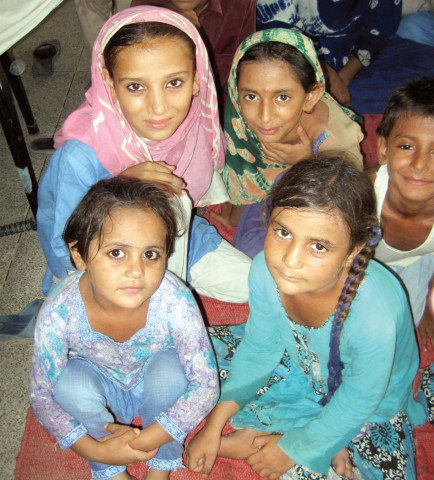A neighbourhood helps flood survivors
Pain, resignation and worry line the faces of the people who are living at a relief camp near Multan’s Madni Chowk.

Housed in New Multan Boys High School that was closed for the summer break, the camp is also home to over 200 children who mill about in the school’s garden or play with each other.
Songs of innocence
The smiling faces of the children belie the pain their parents have gone through to bring them here, and their worry regarding when and how they will go back to homes that are still inundated. Some who came hoping to return in a couple of days have been here longer.
Fida Hussain, who travelled to the camp with 15 family members, is one such man. He had planned to stay in the camp for two days and now has been here for over a week now. He has received no word on whether it is safe for him to travel back to Chowk Qureshi.
“The roads closed a day after we left,” says Hussain. “The only people who will be able to return home are those who have houses left…whoever doesn’t, will not be able to go back.”
Hajra Bibi, from the same area, has nine children with her. “We left when we heard that a bund had been broken and the area would be flooded. We just ran to save our children and left with only our clothes.”
All of her children go to school. “My daughter says she wants to go back because it is time for schools to open,” Hajra Bibi says.
Wide-eyed children sit around their mothers, squealing with excitement at seeing a camera. But they all want to return home, and to their studies. “I want to be a doctor when I grow up!” some of the girls exclaim.
Wazir Mai, who is in her mid-20s and has four children, says several people from their area in Gujrat stayed back to look after the houses. “We have no idea if they are still alive, we cannot talk to them.”
Most of the inhabitants of the camp work as labourers on farms or have leased farm land. Basheer Ahmed, who grows cotton on the 100 acres of land he has leased, says that he has already incurred a loss of Rs1.5 million. He has no idea what condition his land is in now.
Love thy neighbour
The camp was set up when people of the area started to notice flood survivors gathering in a nearby park, and decided to house them in the school premises. The camp’s security in-charge Sadiq Mohammad told The Express Tribune of the camp’s origins. “We saw these people sitting in a park and we wanted to bring them in. But the government had only declared four schools as relief camps, so we spoke to the area nazim [Sher Afgan] and we were allowed to use this space.”
With tens of women and children sharing a room, the camp’s administrators are at pains to ensure that the sanitation facilities are clean, food is distributed properly and a doctor visits twice a day. Several people in the camp have fallen sick, and complain of heat rash, diarrhoea, asthma and allergies.
The camp falls under government domain and is one of the approximately 23 government-run relief shelters in Multan. However, the first help from the government came on August 17 in the shape of the sehri meal on Tuesday morning. The camp’s administration says that EDO Education Multan Afzal Javed has informed them that food, supplied by the Pakistan-Turkey International School and College, would now be provided.
However, residents of the camp begrudge the fact that government representatives have not yet visited them. “Who do we go to ask for help?” Hussain asks.
Mohammad Anwar Saleem Bhatti, a cloth merchant, is neglecting his business to volunteer at the camp. It is a symbol of the spirit the residents of Multan have shown towards helping and accommodating flood survivors, something Sadiq Mohammad also testifies to. “There isn’t a single thing that we’ve asked for which the area’s residents have not donated, whether it is washing powder or soap or food. People are immediately ready to come forward and donate.”
Published in The Express Tribune, August 18th, 2010.



















COMMENTS
Comments are moderated and generally will be posted if they are on-topic and not abusive.
For more information, please see our Comments FAQ